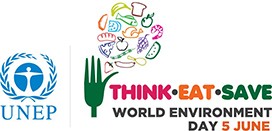 June 5, 2013 marked the 40th annual World Environment Day on the theme of Think-Eat-Save. The United Nations Environment Programme hosted a panel discussion with four speakers who highlighted a different aspect of food and how it affects our world. Every year a different country hosts a week of events in honor of World Environment Day.
June 5, 2013 marked the 40th annual World Environment Day on the theme of Think-Eat-Save. The United Nations Environment Programme hosted a panel discussion with four speakers who highlighted a different aspect of food and how it affects our world. Every year a different country hosts a week of events in honor of World Environment Day.
This year Mongolia is hosting these events. The Ambassador of Mongolia stated that it is very “ironic” for his country to be hosting such a series of events, because Mongolia has a rather low negative environmental impact. Mongolia has an extensive recycling program and they are very conscious of their country’s natural resources and strive to protect these resources. Because of the location of the country however, Mongolia is heavily affected by the changes in the environment, which are caused by many other countries. Mongolia’s temperature has increased 2.1%, which is 2/3 more than the global increase, which is of great concern. The Mongolian Ambassador contends there are many ways to address pressing environmental issues and we need to stand as citizens of the world, not individual countries, in addressing these issues. Addressing the world’s food supply is one way to tackle growing environmental concerns.
In developed countries two-thirds of the food supply is lost. This loss is the result of spoilage through travel and also includes the failure to harvest all available produce. There is also considerable loss due to food that is discarded and enters the waste stream. Each year there is over 6 billion pounds of food that is not harvested. Farmers sell their produce to large companies that can only sell food that is considered to be “perfect”. If vegetables vary in the desired shape, are slightly off-color, or not the preferred weight, companies will not purchase the produce. One of the speakers called this food “funny food”. The panel addressed this issue and how the practice of selling only “perfect food” is a contributing factor to the loss of viable food products. One of the members of the panel stated there are 870 million people in the world that are malnourished and 1 in every 7 people go to bed hungry. Studies suggest that Americans are one of the most wasteful countries with regard to food. One speaker discussed the labeling of food with a “sell by: date”. It is a common misconception that food sold after this date is not safe to eat. This date is simply used to help a store determine how long to display the product and helps the consumer know the date at which the product will be at its peak quality. It does not refer to the date at which food is no longer safe to eat. Food that passes this “sell by date label” is one of the most common foods tossed as garbage when in fact the food continues to be safe for consumption.
The panel discussed ways that we can all address the issue of food waste. They outlined basic suggestions such as taking only food that you will eat, stopping the use of cafeteria trays that enables people to take more food than they will consume, along with other suggestions. Presently, countries such as the UK have actually set goals on cutting their food waste. The UK hopes to cut in half the amount of food going into the waste stream by 2015. It is estimated that 40% of the food prepared for consumption in the United States is wasted. The US is capable of following in the steps of other countries such as the UK in reducing the amount of food going into the water stream and as a result helps to make food available for others.
Learn about the work of the Presbyterian Hunger Program, Self-Development of People, and Environmental Ministries to help Presbyterians end hunger and care for God’s creation.